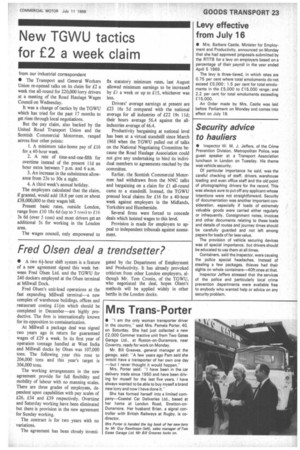Fred Olsen deal a trendsetter?
Page 25

If you've noticed an error in this article please click here to report it so we can fix it.
• A two 6-2L-hour shift system is a feature of a new agreement signed this week between Fred Olsen Ltd. and the TGWU for 240 dockers employed at the Olsen terminal at Millwall Dock.
Fred Olsen's unit-load operations at the fast expanding Millwall terminal—a new complex of warehouse buildings, offices and restaurant costing il+m which should be completed in December—are highly productive. The firm is internationally known for its opposition to containerization.
At Millwall a package deal was signed two years ago in return for guaranteed wages of £29 a week. In its first year of operation tonnage handled at West India and Millwall docks by Olsen was 107.000 tons. The following year this rose to 204.000 tons and this year's target is 304,000 tons.
The working arrangements in the new agreement provide for full flexibility and mobility of labour with no manning scales. There are three grades of employees, dependent upon capabilities with pay scales of £26, £34 and £39 respectively. Overtime and Saturday working have been eliminated but there is provision in the new agreement for Sunday working.
The contract is for two years with no variations.
The agreement has been closely investi
gated by the Department of Employment and Productivity. It has already provoked criticism from other London employers, a]though Mr. Tom Cronin, of the TGWU, who negotiated the deal. hopes Olsen's methods will be applied widely in other berths in the London docks.












































































































